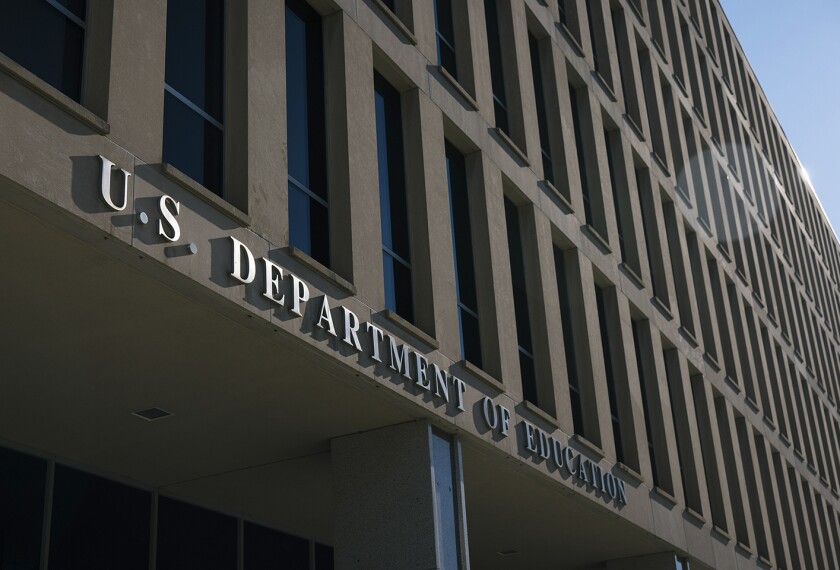Advocates for education redesign are encouraged by a U.S. House of Representatives Appropriations panel’s decision to extend the Race to the Top program for an additional year.
If the extension makes it into the final spending bills for fiscal year 2011, advocates say, that could mean more states will take the reform-minded steps emphasized in the Race to the Top program, such as revamping their teacher-evaluation systems and lifting caps on charter schools, in order to get a slice of the competitive grants. States see another opportunity to secure much-needed funding.
“We are pleased by Chairman [David R.] Obey’s decision to extend Race to the Top funding,” said Gene Wilhoit, the executive director of the Council of Chief State School Officers in Washington, in an e-mail. “States have demonstrated their commitment to meaningful reform, and Race to the Top will aid states in that effort. Thirty-five states and D.C. completed applications this last round, and the department will only be able to fund around 12 states. Extending this program will allow for more state winners.”
The Obama administration had sought $1.35 billion to continue the program in fiscal year 2011, which begins Oct. 1. The legislation, which was approved last week on a party-line vote by the House Appropriations subcommittee that deals with education spending, offers somewhat less than that amount—$800 million.
Race to the Top, a $4.35 billion competitive grant program, was created under the American Recovery and Reinvestment Act last year, and is intended to reward states for making progress on standards, teacher quality, school improvement, and data systems to track student achievement.
The additional spending for 2011 would also include $400 million—just $100 million less than the president’s request—to extend the Investing in Innovation, or i3, grant program, which also was created under the recovery act and initially funded at $650 million. The program is meant to scale up promising practices at the district level.
Michael J. Petrilli, a vice president at the Thomas B. Fordham Institute, said that the proposed $800 million will be particularly effective at furthering district-level reforms.
“Less money will go further if you are talking about districts” rather than just states, he said.
Earlier Cuts
The subcommittee vote to extend these priorities comes just weeks after the House voted to cut $500 million out of the $3.4 billion remaining for a second round of Race to the Top grants, to be awarded by Sept. 30, as part of a package of offsets to help pay for a $10 billion measure to stave off teacher layoffs.
The edujobs measure, which also included cuts to performance pay programs and grants for charter schools, was sponsored by Rep. Obey, a Wisconsin Democrat who serves as chairman of the subcommittee and was the sponsor of the spending bill that extends Race to the Top funding for an additional year. It is unclear whether the Senate will act on the jobs legislation.
Champions of the Race to the Top program were “pleasantly surprised” by Mr. Obey’s decision to keep the program going for an additional year, said Cynthia Brown, the director of education policy at the Center for American Progress, a think tank in Washington.
Extending Race to the Top is “really important for reform momentum. … We’ve seen huge changes in policy” as states have reworked their laws to make themselves more competitive for Race to the Top funds, she said.
A First Step
Copies of the spending bill were not released publicly last week, so it is still unclear whether the subcommittee decided to extend the program to school districts, as the administration had wanted. Right now, only states are eligible to compete for Race to the Top.
Mr. Petrilli, who served in the U.S. Department of Education during President George W. Bush’s first term, said he didn’t expect that Rep. Obey was thrilled about the continuation of the program. Mr. Obey has said publicly that he thinks the program finances extras at a time when schools are struggling just to make their payrolls.
“I don’t know what to make of it,” Mr. Petrilli said of the extension. “It makes me wonder what’s going on behind the scenes. … I suspect Obey did it holding his nose the whole way.”
Although the subcommittee’s move is an important first step, it is unclear whether the Race to the Top extension will make it into the final spending bill.
“I think that’s the question of the day,” said Kate Tromble, the director of legislative affairs at the Education Trust, an organization in Washington that advocates for poor and minority children. “I think it’s a good marker,” she said, of the appropriations bill, but she added that “there’s certainly no requirement to keep it in going forward.”
Supporters of the program, will “need to keep the pressure on, to remind folks that they’ve already put this money in and it ought to stay there,” she said.
Overall, the Education Department would get $71.9 billion. That’s less than the $73.4 billion the president asked for, but an increase over last year’s $64.3 billion.
The bill would include modest increases for special education and Title I grants to districts. Title I would get $16.2 billion, a little more than the president’s request of $15.9 billion and a roughly 3 percent increase over last year. And the measure would include nearly $13 billion for special education, about a 4 percent boost over last year.





